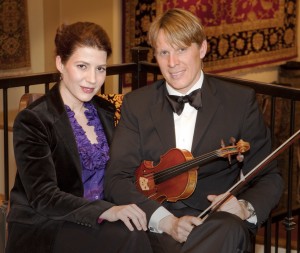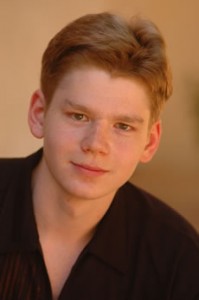When Vedrana Subotic and David Porter started the Intermezzo Chamber Music Series, one of their goals was to present programs offering audiences their favorites while exposing them to newer and, occasionally, neglected works.
And that formula has worked quite well. Thirteen years later Intermezzo is a viable and vibrant part of the Salt Lake music scene with a loyal following.
“We’ve always tried to strike a balance between a lot of favorites that everyone wants to hear and new works. And we’ve stayed true to our intent over the years,” said Subotic, a pianist and the series music director.
And she promised that this summer’s edition of the popular series will be no different.
Intermezzo opens its five-concert series on June 30 with a more traditional program, although it does contain a work by a composer who doesn’t receive the due he deserves: Josef Suk’s Piano Trio in C minor. Suk, Antonin Dvorák’s son-in-law, wrote in a wonderfully romantic, although more Germanic, style than did Dvorák. And the piece blends in well with the remaining program, which includes Robert Schumann’s Violin Sonata in A minor, op. 105, a late work, and Dvorák’s Piano Quartet No. 2 in E flat major.
The Schumann is actually a late replacement. Originally, Krysztof Penderecki’s Violin Sonata No. 2 was on the program. However, a pregnant Heather Conner, who was going to be the evening’s pianist, surprised everyone by having her baby early. “She wasn’t due for another five weeks,” Subotic said. Replacing her will be Hyunsoon Whang, sister of Utah Symphony cellist Pegsoon Whang, who will also play at the concert.
Two composers whose names aren’t associated with chamber music will be represented this summer. Gioachino Rossini’s Sonata in C major for four strings will be played on the July 14 concert, while Richard Strauss’ early and quite demanding Violin Sonata in E flat major will be on the last concert, on Aug. 11.
Also on the July 14 program will be Sergei Prokofiev’s seldom played Quintet in G minor, op. 39, and Johannes Brahms’ Clarinet Quintet in B minor. “The Brahms is everyone’s favorite,” Subotic said. Playing it will be the Utah Symphony’s new associate principal clarinet Erin Svoboda, who will also be featured prominently in the Prokofiev quintet.
Paired with the Strauss sonata on Aug. 11 is Tchaikovsky’s Piano Trio in A minor. The Strauss isn’t performed very often, unlike the Tchaikovsky, which is a standard in the piano trio repertoire. “The Tchaikovsky is a well known and well loved work,” Subotic said.
The July 28 concert will offer two Utah premieres: Nikolai Kapustin’s Concerto for Two Pianos and Percussion and Iannis Xenakis’ Kassandra.
While hardly a household name in Utah, the 76-year-old Ukrainian Kapustin catapulted to international attention in the early 1980s with his Variations for Piano, op. 41, which uses the opening bassoon solo from Igor Stravinsky’s The Rite of Spring, but in a jazzed up form. “He uses some neat and interesting jazz idioms in his music,” said Subotic, who is very familiar with Kapustin’s music. She added that the Concerto is an extremely demanding piece. “It’s very virtuosic and very difficult rhythmically.”
Xenakis’ piece is scored for baritone and percussion. The text is from the Oresteia
and the singer, in this case Michael Chipman, is required to represent both Kassandra and the chorus. “He’s also required at times to play the psaltery [an ancient plucked string instrument],” Subotic said, adding that it’s a fabulously difficult work for both the singer and the percussionist. “The percussion part is incredibly exciting and dramatic. I’m really thrilled to have this piece on the program.”
Rounding out the concert is Bartók’s Sonata for Two Pianos and Percussion.
Finally, the Aug. 4 concert will focus on music for woodwinds, with works by Ibert, Prokofiev, Kurtág and Mozart.
Programming concerts with such divergent repertoire can pose some challenges, but Subotic said it’s always been a collaborative effort between her and Porter, a member of the violin section of the Utah Symphony and a violist on occasion who is also the president of Intermezzo. “The origins of our repertoire programming always seem to unfold from a few ideas that are carried over from the summer before. David and I still brainstorm together and share responsibilities that fall outside of our respective ‘titles’ so nothing is exactly divided between us.” It’s an organic process, she added.
Below is the concert schedule. All concerts start at 7:30 p.m. and take place in Vieve Gore Concert Hall on the Westminster College campus. Individual tickets are $18 for general admission and $16 for seniors. Season tickets are $80 for general admission and $65 for seniors. Students are admitted free with ID. Tickets can be purchased at the door or in advance by calling 801-200-3388 or by logging on to www.intermezzoconcerts.org.
- June 30 — Program: Suk, Piano Trio in C minor; Schumann, Violin Sonata in A minor, op. 105; Dvorák, Piano Quartet No. 2 in E flat major. Performers: Lun Jiang, violin; David Porter, violin and viola; Pegsoon Whang, cello; Hyunsoon Whang, piano.
- July 14 — Program: Rossini, Sonata in C major; Prokofiev, Quintet in G minor, op. 39; Brahms, Clarinet Quintet in B minor. Performers: David Porter, Elina Lev, violin; Roberta Zalkind, viola; Pegsoon Whang, cello; Ted Merritt, bass; James Hall, oboe; Erin Svoboda, clarinet.
- July 28 — Program: Kapustin, Concerto for Two Pianos and Percussion; Xanakis, Kassandra; Bartók, Sonata for Two Pianos and Percussion. Musicians: Vedrana Subotic, Karlyn Bond, Kimi Kawashima, piano; Michael Chipman, baritone; Eric Hopkins, Keith Carrick, percussion.
- Aug. 4 — Program: Ibert, Trois pièces brèves; Prokofiev, Sonata in D major for Flute and Piano; Kurtág, Bagatelles; Mozart, Woodwind Quintet in E flat major, K. 452. Performers: Mercedes Smith, flute; Lissa Stolz, oboe; Erin Svoboda, clarinet; Lori Wike, bassoon; Ron Beitel, horn; Jens TenBroek, bass; Karlyn Bond, piano.
- Aug. 11 — Program: Strauss, Violin Sonata; Tchaikovsky, Piano Trio in A minor. Performers: Kathryn Eberle, Karen Wyatt, violin; Matthew Johnson, cello; Vedrana Subotic, piano.


